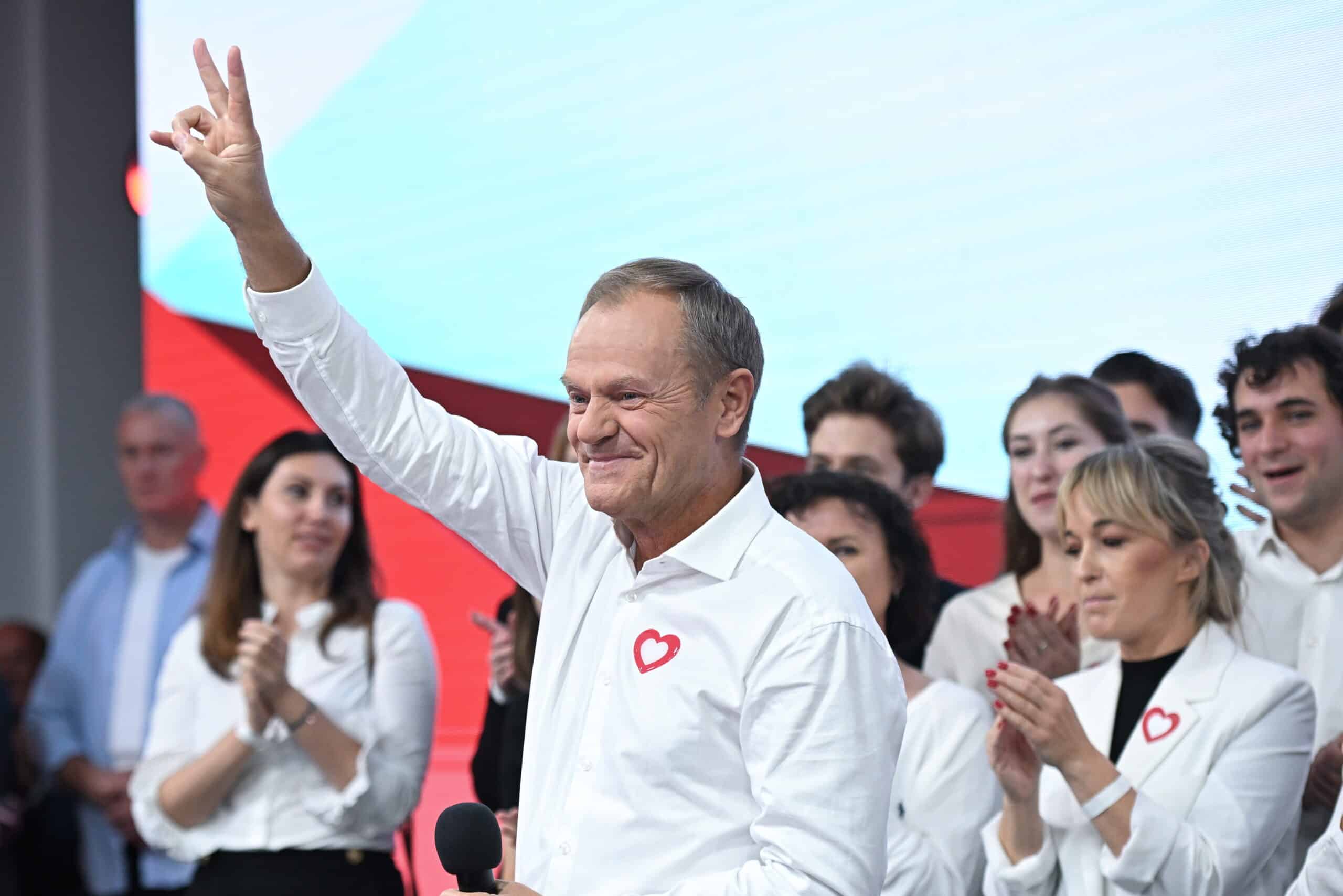Ruling PiS wins most seats, but set to lose power
Defeating ruling PiS and agreement on reversing Poland’s ‘anti-democratic’ turn are one thing. But can the three parties agree on a cohesive policy program?
Jo Harper
The National Electoral Commission said on October 17 that Law and Justice (PiS) had won 35.38%, Civic Coalition (KO) 30.70%, the Third Way 14.40%, the Left 8.61% and Confederation 7.16% in October 15’s election.
The majority of seats will go to PiS, with 194 MPs, Civic Coalition 157 MPs, while the Third Way gets 65 MPs and the Left 26. The last party in the Sejm is the Confederation with 18 MPs.
This opened the door to an opposition coalition of KO, Third Road and the New Left – led by Donald Tusk, ex-Polish prime minister and European Council president.
Election officials said later that turnout was 74%, the highest since the fall of communism in 1989.
A larger proportion of 18-29 year-olds turned out to vote than over-60s, Ipsos said.
Poland is divided into 41 districts and has a proportional representation system for its parliament, based on party lists. It has a party-list PR voting system to its 460-seat lower house of parliament. Parties win seats based on the aggregate vote for their candidates in each constituency and then spread the seats to candidates with the highest totals. Individual parties must win at least 5% of the vote to earn a seat in parliament and coalitions at least 8%.
Wrangling ahead
“For us it’s obvious that the [government] coalition will be us, the Third Way and the Left,” said Borys Budka, head of the KO parliamentary faction.
But PiS-friendly president, Andrzej Duda, could make it difficult for them to govern. Duda will be head of state for two more years and during this time will be able to veto laws. To override the president’s veto, 276 out of 460 MPs are needed. KO, Third Way and the New Left are lacking 28 votes.
Władysław Kosiniak-Kamysz on “Morning Conversation on RMF FM” on October 16 appealed to Duda for dialogue and ruled out a potential coalition with PiS. “Those who voted for us want a change of government,”said the leader of PSL, the People’s Party and main player in the Third Way.
He appealed to Duda to consult with the parties that can actually create a government before entrusting him with the mission of forming a government.
“The president has the right to indicate who he considers the right candidate to form the government, but not the president’s bad will. I’m sure he will show common sense and responsibility,” said Tusk.
PiS defends
“No matter how you look at it, we won. We will see when the seats are divided whether there will be any room to continue the game,” Joachim Brudziński, head of the PiS’s electoral staff, told RMF FM.
When asked who PiS would form a coalition with, Brudziński said PiS could talk to PSL. “If we are to think about creating a coalition, it is natural that we will talk to PSL,” he said.
PSL ran in the elections in a coalition with Szymon Hołownia’s Polska 2050. Third Way said it did not intend to form a coalition with PiS.
Brudziński said that for him the obvious candidate for prime minister was the incumbent Mateusz Morawiecki.
Not many agree. “Morawiecki will no longer be a natural candidate to succeed Kaczyński,” according to prof. Rafał Chwedoruk, a political scientist from the University of Warsaw. “At least one thing seems clear. If these results are confirmed, Morawiecki will no longer be a natural candidate to succeed Kaczyński or possibly to be a candidate in the presidential elections,” Chwedoruk said. Kaczyński’s successor may be Mariusz Błaszczak, the current Minister of National Defense, he added.
What next?
Scenario one. President appoints new prime minister
Pursuant to Art. 109 section 2. of the Constitution, the first session of the Sejm and Senate is convened by the president for a day falling within 30 days from the election day, so it should take place no later than Tuesday, November 14. At the same time, as Art. 154 section 1 of the Constitution, the president designates the Prime Minister, who presents the composition of his government. The president then appoints him within 14 days of the first sitting of the Sejm.
Assuming a similar scenario as in 2019, the Sejm would meet no later than Tuesday, November 14, and the president should appoint the government by Tuesday, November 28.
Importantly, the Constitution does not regulate who the president appoints as prime minister. Typically, this is the leader of the party that obtained the most votes. This happens especially when the party has an absolute majority of seats, i.e. 231 (more than half of 460). The results of the exit pool show that PiS, which won the most votes, is 31 MPs short of this number, and if Confederation is included, it is 19 MPs.
If the party does not have a clear majority, the president can appoint a representative of the coalition, but he doesn’t have to.
Then, the Prime Minister appointed by the president delivers an exposé to the Sejm, which votes on granting a vote of confidence to the government. The time to grant a vote is therefore until December 12. Pursuant to Art. 154 section 2 of the Constitution, the Prime Minister, within 14 days from the date of appointment by the President of the Republic of Poland, presents to the Sejm the program of activities of the Council of Ministers with a request for a vote of confidence in it. The Sejm passes a vote of confidence by an absolute majority of votes in the presence of at least half of the statutory number of Deputies.
Scenario two. Sejm elects prime minister
However, it may turn out that the president will not appoint a government or the one appointed will not receive a vote of confidence, e.g. if the president entrusts the position of prime minister to someone from PiS.
Another scenario is outlined in Art. 154 section 3 of the Constitution. According to this, if the president fails to appoint the Council of Ministers or fails to grant it a vote of confidence, the Sejm appoints the government. This must be done within 14 days from the expiry of the deadline for appointing a government by the president or granting a vote of confidence. Assuming that it is more likely that the vote of confidence will not be obtained, the Sejm would have to elect a new government by Tuesday, December 26. Here, too, an absolute majority of votes is required in the presence of at least half of the statutory number of MPs. The government chosen in this way is appointed by the president.
Scenario three. President again appoints prime minister
The reserve procedure for appointing the government is specified in Art. 155 of the Constitution. According to it, Duda reappoints the Prime Minister and, at his request, ministers within 14 days. The next deadline for forming a government would be Tuesday, January 9, 2024. The Sejm then has 14 days to grant a vote of confidence by a majority of votes in the presence of at least half of the statutory number of deputies. In the third scenario, a simple majority is enough.
Scenario four. snap elections
If the third scenario ends in failure, the Constitution provides only one last solution. The President of the Republic of Poland shortens the term of office of the Sejm and orders elections. Article 98 of the Constitution specifies that the President, when ordering the shortening of the term of office of the Sejm, must simultaneously order elections to the Sejm and the Senate and set their date to fall no later than within 45 days from the date of ordering the shortening of the term of office of the Sejm.
Early elections are also possible for another reason, namely where the government is formed by opposition parties, but they do not have a majority to override the president’s veto.
The question then is what will Duda do?
The coalition that is appearing the most likely outcome of Sunday’s election in Poland – made up of KO), the Third Way and the New Left – share promises to reverse what they say is Poland’s democratic backsliding since PiS came to power in 2015 and all three say public spending on education, health and reversing restrictive abortion laws are paramount. But how this would be paid for, fiscal policy, is perhaps the crucial arena in which positions and responsibilities will be allocated in the weeks ahead.
Cleaning up: The manifesto of the Civic Coalition (KO), contained in the document “100 specifics for 100 days,” can be divided into demands regarding “cleaning up” after the rule of Law Justice (PiS) and what changes KO wants.
It says: “holding those responsible for the scandals accountable; restoring the rule of law and transparency of public life (including transparency of public finances); depoliticizing institutions that should not be political (e.g. Polish Television).”
All three groups share the desire to restore order in the justice system, primarily in the Supreme Court, the prosecutor’s office and the Constitutional Tribunal. They unanimously said they will liquidate the current National Council of the Judiciary and re-establish it in a composition consistent with the Constitution.
During the campaign, the KO also emphasized the need to unblock EU funds, including funds from the National Reconstruction Plan.
What else connects them?
Education: What connects the parties may be drawing attention to the role of the education system. KO says it wants to depoliticize schools and raise salaries for teachers. The Left’s program includes provisions regarding an increase in salaries at universities and the introduction of a universal scholarship system for all people up to 26 years of age and continuing their education, while the Third Way wants 6% of GDP to be allocated to the education system.
Abortion and women’s rights: KO went to the elections with promises addressed directly to women, for example emergency contraception without a prescription and legal abortion up to 12 weeks of pregnancy. KO promised the introduction of 1,500 zlotys per month for women returning to the labor market after giving birth. These funds can be used in any way – to hire a babysitter, pay for a nursery, said KO leader Donald Tusk.
Housing: One of the most strongly promoted points of the Left’s electoral program was in the area of housing. In its election program, the party declared: “In the years 2025-2029, we will build 300,000 modern apartments for cheap rent as part of the National Housing Program.” KO election promises also included the introduction of a zero-interest loan for the purchase of a new apartment or PLN 600 subsidy for renting an apartment for young people. Third Way said it would “give” one million apartments to Poles during one parliamentary term.
Military spending: The Third Way wants to maintain military spending. It said 50% of equipment should be purchased in the country, from Polish companies, and the rest abroad.
Sunday trading: Third Way wants to significantly loosen the ban on trading on Sundays. It proposes the return of two trading Sundays a month.
Potential points of disagreement
Abortion: The Left wants to introduce the right to terminate a pregnancy up to the 12th week, depending solely on the woman’s decision. It also promised to introduce the institution of civil partnerships (regardless of gender) into the Polish system. There should be no problems with financing in vitro from the state budget as all three parties are in favor. On liberalization of abortion laws, the duo of PSL leader Kosinak-Kamysz and Poland 2050’s Szymon Hołownia want a referendum.
Tax and spending: It may be a bit more difficult to find a compromise regarding taxes. While the Left is striving to increase social welfare, the Third Way went to the elections with the promise of “an end to handouts.” Perhaps crucially, Third Way also promised it would not raise taxes.
All three parties promised to maintain the benefits introduced by PiS during its eight-year rule (e.g. 800+).
However, Third Way is cautious in introducing new benefits that involve paying money directly into people’s pockets. Instead, it proposes new tax relief: the so-called family PIT, the tax base of which will decrease with more children.
KO announced a second indexation of pensions and annuities in a year, when inflation exceeds 5%, as well as payment of 1,500 zlotys, the so-called “grandmother” payment for taking care of children.
The Left, on the other hand, wants to introduce a widow’s pension, retirement of people with long service history and a senior tourist voucher.
One of KO’s flagship promises was to increase the tax-free amount to 60,000 zlotys. The Left also supported increasing it, but no specific amount was given. The Third Way was cautious about this. KO and Third Way agree, for example, on restoring the possibility of deducting health insurance contributions from taxes.
The Left, in turn, would like to reduce the VAT rate and introduce a progressive PIT rate, in which the highest earners would pay more.
Third Way wants to introduce the so-called French PIT, operating according to the mechanism: the more children you have, the lower the taxes you pay. Moreover, families with at least three children would not pay tax at all.
All three parties unanimously support a return to the VAT rates of 22% and 7%.
PiS in opposition
KO’s manifesto explicitly said it would “put Andrzej Duda before the State Tribunal in the first hundred days after taking power.”
This probably means the almost 200-strong PiS parliamentary club will fight its corner, and the role of president, Andrzej Duda, is crucial, says specialist Grzegorz Sroczynski. “His international career after 2025 depends on the president’s relative neutrality. And he knows it. This does not mean that we should expect too much from Duda and in the first step he will indicate a PiS candidate for prime minister,” Sroczynski says
On Tuesday, Donald Tusk appealed to the president to decide soon. “I am making an urgent appeal to the president. People are waiting for the first decisions that will be a consequence of these choices. I would like to ask the president to make quick and energetic decisions. The winning democratic parties are ready to take over responsibility for governing the country at any time, but the president is constitutionally responsible for this process of transfer of power,” said Tusk.
The Polish zloty is the top-performing emerging markets currency in October; the Warsaw WIG20 benchmark index skyrocketed and yields on sovereign bonds collapsed after the pro-EU opposition parties were seen as likely to form the new government. “Such an outcome is neither a shock nor the most probable result in light of the latest opinion polls,” says Bartosz Sawicki, market analyst at Conotoxia fintech.
“The opposition’s win is the best-case scenario from the market’s standpoint,” Sawicki says. Unfreezing access to EU recovery aid worth EUR 37 billion is the top priority on the new coalition’s agenda. Markets welcome the prospect of a more prudent approach to fiscal policy and expect the credibility of the institutional framework to be restored. Investors also bet on a hawkish turn by the National Bank of Poland. The PLN’s rally may take a breather as the central bank will likely cut rates next month, and forming a new government may last until December. The zloty, which in the last month appreciated over 5 pct against the euro, should hold to most recent gains, the analyst said.







